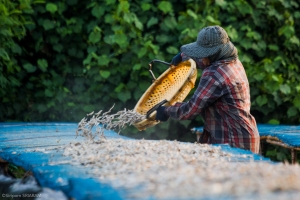Newsroom :: News :: New toolkit helps development practitioners integrate gender into sustainable coastal resource management in Asia
New toolkit helps development practitioners integrate gender into sustainable coastal resource management in Asia
Location: Bangkok, Thailand. 8th Mar 2019

The toolkit aims to help coastal and fisheries management practitioners, such as programme officers and technical advisors from development and environmental agencies, develop baseline knowledge around gender dimensions related to coastal and natural resources use, livelihoods development and ecosystems management. This knowledge can help identify gender gaps and advance gender-integrated and gender responsive planning for improved resilience of coastal ecosystems and the communities that depend on them. The toolkit also provides direction around key instruments, concepts and themes for qualitative gender analysis in coastal ecosystem-dependent communities.
The toolkit is an iterative development process meant to be revisited and revised to reflect new circumstances and emergent learning at different stages, and from sites where the analysis is conducted.
“As gender norms, roles and dynamics are not static and do not exist in discrete terms, the tools we use should be able to capture and reflect social changes as they happen,” said Maeve Nightingale, Senior Programme Officer, Coastal and Marine Programme, IUCN Asia.

The GAT is one of the main outputs of a MFF-SEAFDEC-SEI regional gender study, funded by the Swedish International Development Cooperation Agency (SIDA). The study explored gender patterns in coastal and marine resources management, with the aim of improving overall understanding about the state of women and men in environmental decision-making. The study also identified the main challenges preventing equitable opportunities for men and women in the coastal fisheries and coastal resource management sectors.
The study, along with a resulting synthesis report contributes to strengthening our collective understanding and commitment towards achieving gender equality as a core part of coastal and marine resource management and the Sustainable Development Goals (SDGs), in particular, SDG 5 and SDG 14.
The GAT was tested and improved throughout the study.
Gender analysis is a way of understanding how perceptions of gender in terms of norms and values, gender roles, and identities and gendered power relations among and within social groups are produced and reproduced within the processes of social change. The continuity perspective is paramount to gender analysis as it explains the dynamic character of gender identities and relations embedded in both structural and contingent processes.
This year’s theme for International Women’s Day is “Better the balance, better the world”.
‘’Sustainable development in South and Southeast Asia cannot be achieved without the talent, knowledge and experience of half the population caring for marine and coastal resources at all levels of decision-making: at regional, national and community scales. However, biases and social-gender norms have constrained humanity from being more inclusive,’’ said Bernadette P. Resurrección, Head of the Gender Team, SEI Asia.
Across the world, women and men have unique relationships with, and expertise, about their environment. Poor understanding of the roles and contributions that both genders bring to environmental management often leads to a lack of recognition of their distinct needs and interests in policies and programmes. Understanding the importance of this can ultimately help in meeting sustainable development goals in ecosystem-dependent communities. The GAT will bring to light areas of inequality, paving the way for more gender-balanced responses and outcomes.
The Gender Analysis Toolkit can be downloaded here:
http://www.mangrovesforthefuture.org/knowledge-hub/e-library/?documentId=19157
The Regional Gender Synthesis can be downloaded here:
http://www.mangrovesforthefuture.org/knowledge-hub/e-library/?documentId=19156

Setting our the daily catch for drying, Phuket, Thailand © Siriporn Sriaram